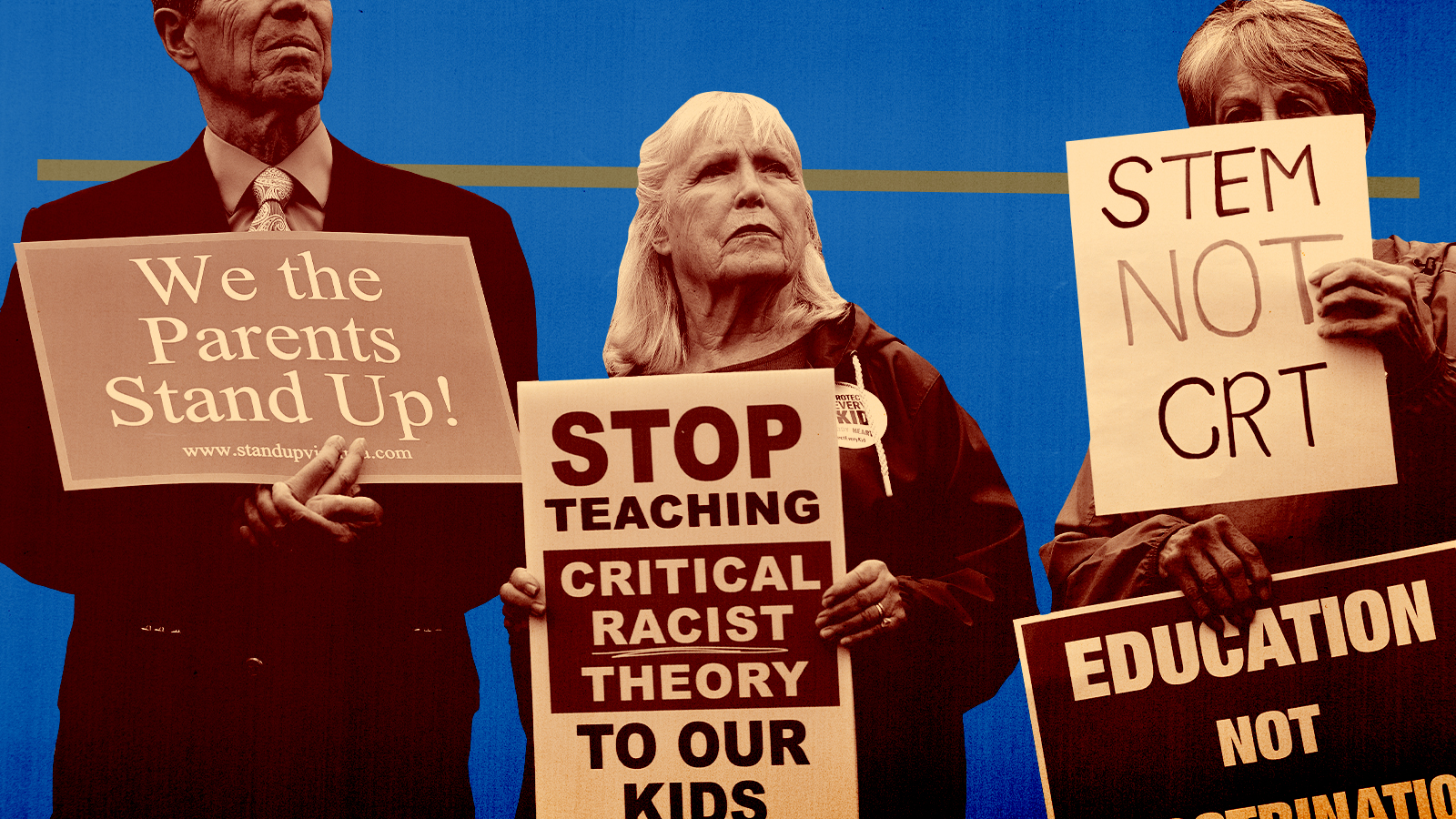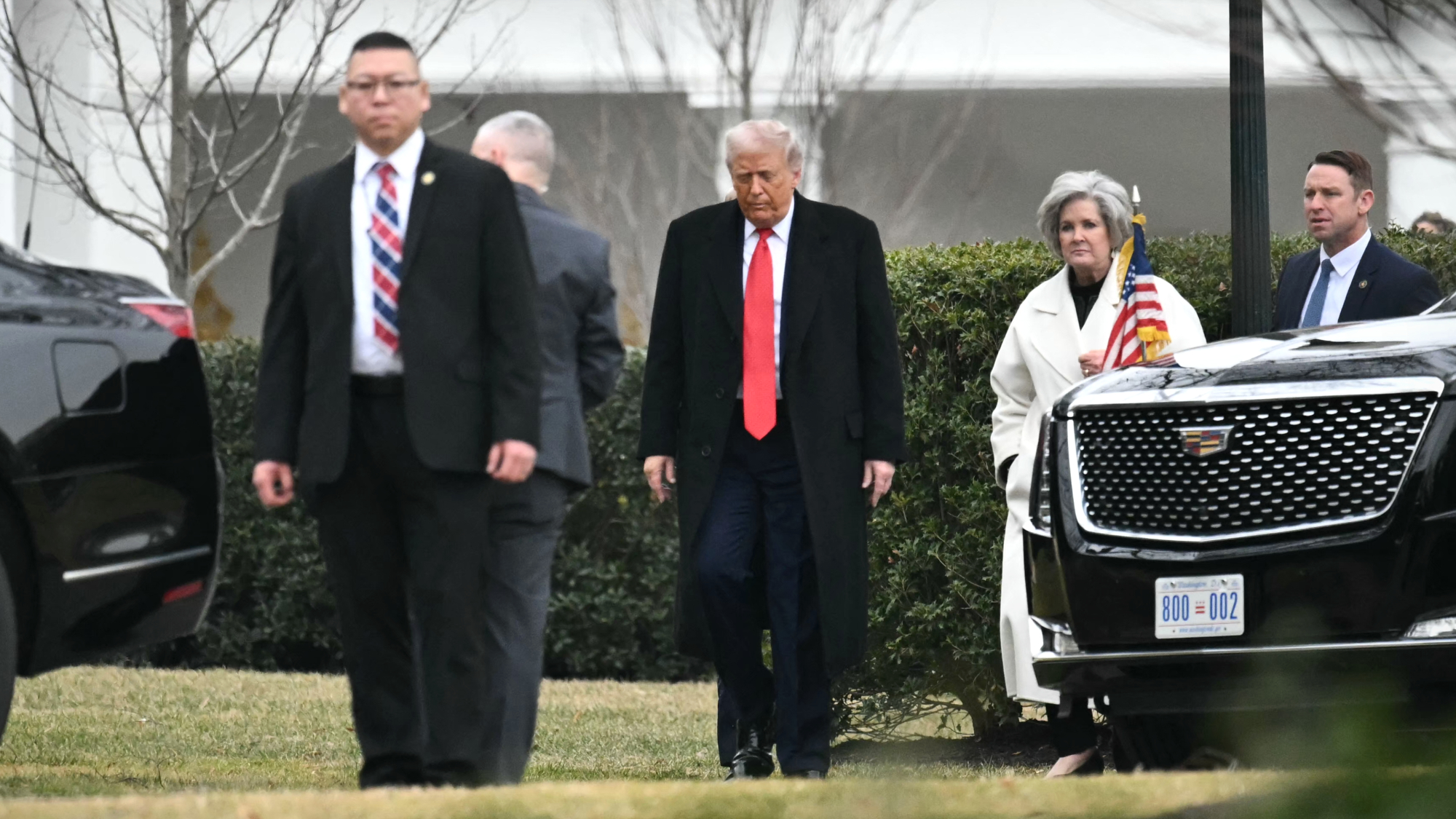Understanding the critical race theory debate


A free daily email with the biggest news stories of the day – and the best features from TheWeek.com
You are now subscribed
Your newsletter sign-up was successful
Republican governors, state legislatures, and members of Congress are up in arms about critical race theory, a once-obscure framework taught in graduate and law schools. What's all the fuss about?
What is critical race theory?
Critical race theory, or CRT, is an intellectual framework for understanding U.S. history and society through a lens of institutionalized racism. Most critical race theorists argue that race is a social invention, not biological fact, but that racism is real and enshrined in U.S. laws and other institutions to maintain America's foundational dominance of white people. It's an effort to examine "the ways in which racial inequality is embedded in structures in ways of which we are very often unaware," says Kendall Thomas, an editor of the book Critical Race Theory: The Key Writings That Formed the Movement.
The Week
Escape your echo chamber. Get the facts behind the news, plus analysis from multiple perspectives.

Sign up for The Week's Free Newsletters
From our morning news briefing to a weekly Good News Newsletter, get the best of The Week delivered directly to your inbox.
From our morning news briefing to a weekly Good News Newsletter, get the best of The Week delivered directly to your inbox.
Is it new?
No. The late Derrick Bell is generally credited with coming up with the framework in the 1970s, when he was a Harvard Law professor. Bell and other academics who championed critical race theory were grappling with what they saw as the shortcomings of the civil rights movement and its focus on racial equality through colorblindness. CRT developed into an organized field at the first Workshop on Critical Race Theory in 1989, and it has been taught at law school and in certain graduate programs ever since.
Why is everybody talking about it now?
Right-wing activists, media organizations, and think tanks became interested in critical race theory in the aftermath of George Floyd's murder by Minneapolis cops in May 2020. During the summer of Floyd-inspired protests, anti-racism reading lists became ubiquitous in some quarters of America and many K-12 schools began revamping their curricula to address structural racism and make classrooms more equitable. Some parents objected, and a network of anti-anti-racism organizations formed, supported by conservative think tanks and law firms. They got a huge boost from conservative media outlets, notably Tucker Carlson's Fox News show. Fox News, which first mentioned critical race theory in 2012, used the phrase in passing only twice in 2019 — then invoked it in more than 150 broadcasts since June 5, 2020, The Atlantic reports. The New York Times' landmark "1619 Project," a refocusing of American history through the lens of Black enslavement, also galvanized opponents of critical race theory.
A free daily email with the biggest news stories of the day – and the best features from TheWeek.com
How have opponents tried to stifle critical race theory?
After Carlson hosted prominent CRT critic Christopher Rufo on his Fox News show in early September 2020, former President Donald Trump quickly signed an executive order banning federal agencies and contractors from training employees in "critical race theory," "white privilege," or anything else that suggests the U.S. is "an inherently racist or evil country." A federal judge struck down Trump's order and President Biden rescinded it on his first day in office, but Rufo, a 36-year-old senior fellow at the conservative Manhattan Institute, tells The Atlantic that Trump's executive action is when the "real fight against critical race theory began." In the meantime, CRT critics started hounding and working to flip local school boards, and GOP-led state legislatures began banning the teaching of critical race theory in public schools.
Is critical race theory actually being taught in public schools?|
The short answer is no. "Critical race theory is not something we teach to students," Lisa Luten, a spokeswoman for North Carolina's Wake County Public School System, said after Republicans complained about a professional development session teachers attended on critical race theory. "It's more of a theory in academia about race that adults use to discuss the context of their environment." Some critics argue that CRT trickles down into the classroom through such anti-racism training for teachers, and ideas central to critical race theory — like how slavery's legacy and racism still affect Black Americans — are used in some schools. The 1619 Project, for example, developed a curriculum for K-12 classrooms.
What are the arguments against critical race theory?
Critics say it is divisive and paints the U.S. in a negative light. When signing his fleeting executive order, Trump called critical race theory and The 1619 Project "a crusade against American history" and an "ideological poison" that "will destroy our country." Florida Gov. Ron DeSantis (R) railed against "things like critical race theory" in March, telling reporters, "Teaching kids to hate their country and to hate each other is not worth one red cent of taxpayer money." Alabama state Rep. Chris Pringle (R), who has pre-filed a bill banning critical race theory in K-12 and higher education, told an Alabama Media Group reporter that CRT "basically teaches that certain children are inherently bad people because of the color of their skin, period." When asked if he could point to any critical race theorists making that argument, Pringle said, "Yeah, uh, well — I can assure you — I'll have to read a lot more," adding that he's pushing his bill "to start the conversation."
What do proponents say?
Liberals and Democrats don't appear to have much to say about critical race theory, except to point out how conservatives and Republicans are misusing the term.
Do its critics understand critical race theory?
As with most graduate-level academic theories, very few people — critics or committed anti-racists — probably fully understand the intellectual framework. But critical race theory has become a sort of incantation for a broad range of race-adjacent ideas conservatives find objectionable: systemic racism; white privilege, guilt, or rage; inherent bias; diversity, equity, and inclusion (DEI); or any number of "woke" racial bugbears. "The vagueness of the language is really the point," says Leah Cohen, an organizer with the liberal New Hampshire nonprofit Granite State Progress. Rufo acknowledged as much in March. "We have successfully frozen their brand — 'critical race theory' — into the public conversation and are steadily driving up negative perceptions," he tweeted. "We will eventually turn it toxic ... The goal is to have the public read something crazy in the newspaper and immediately think 'critical race theory.'"
So what are we really fighting about when we fight about critical race theory?
Some conservative strategists have been pretty open about returning Republicans to power by banging on the critical race theory drum. But the fault lines are real and complex. The battle over critical race theory touches on identity, politics, and, above all, race: whether racism still exists in the U.S., who perpetuates it, and how (or if) to address it. This is, as critical race theorists underscore, a question that has plagued America since its founding as a country grounded in freedom and reliant on slavery.
Peter has worked as a news and culture writer and editor at The Week since the site's launch in 2008. He covers politics, world affairs, religion and cultural currents. His journalism career began as a copy editor at a financial newswire and has included editorial positions at The New York Times Magazine, Facts on File, and Oregon State University.
-
 Health insurance: Premiums soar as ACA subsidies end
Health insurance: Premiums soar as ACA subsidies endFeature 1.4 million people have dropped coverage
-
 Anthropic: AI triggers the ‘SaaSpocalypse’
Anthropic: AI triggers the ‘SaaSpocalypse’Feature A grim reaper for software services?
-
 NIH director Bhattacharya tapped as acting CDC head
NIH director Bhattacharya tapped as acting CDC headSpeed Read Jay Bhattacharya, a critic of the CDC’s Covid-19 response, will now lead the Centers for Disease Control and Prevention
-
 House votes to end Trump’s Canada tariffs
House votes to end Trump’s Canada tariffsSpeed Read Six Republicans joined with Democrats to repeal the president’s tariffs
-
 How are Democrats trying to reform ICE?
How are Democrats trying to reform ICE?Today’s Big Question Democratic leadership has put forth several demands for the agency
-
 Is Alex Pretti shooting a turning point for Trump?
Is Alex Pretti shooting a turning point for Trump?Today’s Big Question Death of nurse at the hands of Ice officers could be ‘crucial’ moment for America
-
 Halligan quits US attorney role amid court pressure
Halligan quits US attorney role amid court pressureSpeed Read Halligan’s position had already been considered vacant by at least one judge
-
 House approves ACA credits in rebuke to GOP leaders
House approves ACA credits in rebuke to GOP leadersSpeed Read Seventeen GOP lawmakers joined all Democrats in the vote
-
 The billionaires’ wealth tax: a catastrophe for California?
The billionaires’ wealth tax: a catastrophe for California?Talking Point Peter Thiel and Larry Page preparing to change state residency
-
 Vance’s ‘next move will reveal whether the conservative movement can move past Trump’
Vance’s ‘next move will reveal whether the conservative movement can move past Trump’Instant Opinion Opinion, comment and editorials of the day
-
 Bari Weiss’ ‘60 Minutes’ scandal is about more than one report
Bari Weiss’ ‘60 Minutes’ scandal is about more than one reportIN THE SPOTLIGHT By blocking an approved segment on a controversial prison holding US deportees in El Salvador, the editor-in-chief of CBS News has become the main story
